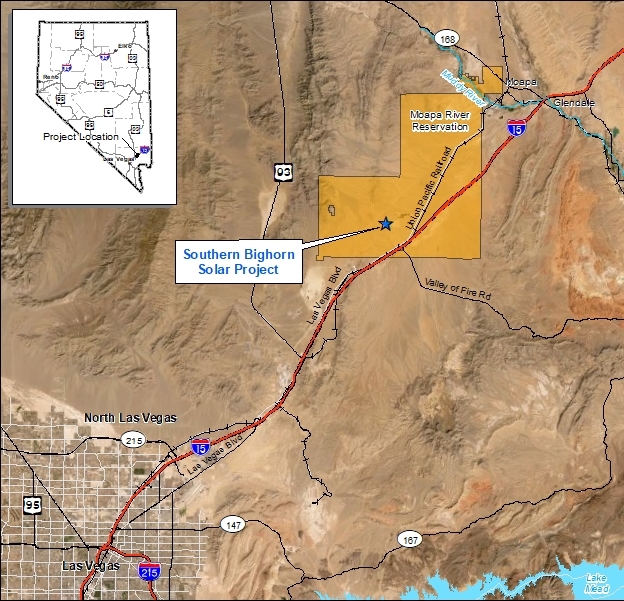
- Details
- By ALINA BYKOVA
The Bureau of Indian Affairs (BIA) and the Moapa Band of Paiute Indians in Nevada announced on Thursday that they are seeking comments on potential environmental impacts of the tribe’s proposed Southern Bighorn Solar Project (SBSP).
The project includes two solar energy ground leases providing for the “construction, operation and maintenance, and eventual decommissioning of two solar electricity generation and battery energy storage facilities,” the BIA said in a press release.
The solar energy facilities will be located on tribal lands within the Moapa River Indian Reservation located in Clark County, Nevada, about 40 miles northeast of Las Vegas.
The BIA is now in the 45-day public comment and review period for the Draft Environmental Impact Statement (DEIS) prepared under the National Environmental Policy Act.
Due to the Covid-19 pandemic, the BIA and project sponsors will hold virtual public meetings to discuss and hear comments on the DEIS. The meetings will be open to the public and all interested parties are encouraged to attend. The meetings can be accessed through a link on the project’s website.
The first meeting will be held Tuesday, April 13, 2021, at 1:30 p.m. PT, and the second on Wednesday, April 14, 2021, at 5:30 p.m. PT.
A PowerPoint presentation will also be posted to the project’s website prior to the virtual meetings. Those who cannot access the live-stream presentation can join the meeting by phone. The live presentation will also be recorded and made accessible for viewing throughout the comment period. To join the meeting by phone, call 699-900-6833 or 346-248-7799 and enter the passcode 955341739. The meeting identification number for both meetings is 904-140-7949.
Interested parties can review the DEIS and submit comments on the project website.
Help us defend tribal sovereignty.
At Native News Online, our mission is rooted in telling the stories that strengthen sovereignty and uplift Indigenous voices — not just at year’s end, but every single day.
Because of your generosity last year, we were able to keep our reporters on the ground in tribal communities, at national gatherings and in the halls of Congress — covering the issues that matter most to Indian Country: sovereignty, culture, education, health and economic opportunity.
That support sustained us through a tough year in 2025. Now, as we look to the year ahead, we need your help right now to ensure warrior journalism remains strong — reporting that defends tribal sovereignty, amplifies Native truth, and holds power accountable.
 The stakes couldn't be higher. Your support keeps Native voices heard, Native stories told and Native sovereignty defended.
The stakes couldn't be higher. Your support keeps Native voices heard, Native stories told and Native sovereignty defended.
Stand with Warrior Journalism today.
Levi Rickert (Potawatomi), Editor & Publisher
